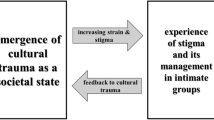Abstract
Works of human rights literature help to ground the formal rights system in an informal rights ethos. Writers have developed four major modes of human rights literature as follows: protest, testimony, lament, and laughter. Through interpretations of poetry in Carolyn Forché’s anthology, Against Forgetting, and novels from Rwanda, the US, and Bosnia, I focus on the mode of lament, the literature of mourning. Lament is a social and ritualized form, the purposes of which are congruent with the aims of transitional justice institutions. Both laments and truth commissions employ grieving narratives to help survivors of human rights trauma bequeath to the ghosts of the past the justice of a monument while renewing the survivors’ capacity for rebuilding civil society in the future. Human rights scholars need a broader, extrajuridical meaning for “transitional justice” if we hope to capture its power.
Similar content being viewed by others
References
Alexiou M (1974) The Ritual Lament in Greek Tradition. Cambridge University Press, New York.
Bakhtin M M (1981) Forms of time and of the chronotope in the novel. In: Holquist M (ed.) The Dialogic Imagination. University of Texas Press, Autin, TX, 84-258.
Best M, Long W J, Etherton J, and Smyth T (2011) Rich digital media as a tool in post-conflict truth and reconciliation, in media, War & Conflict 4.3: 231-249.
Borer T (2012) (ed.) Media, Mobilization, and Human Rights. Zed Books, New York.
Burke E (1992) A philosophical enquiry into the origin of our ideas of the sublime and the beautiful. In: Adams H (ed.) Critical Theory Since Plato. Harcourt Brace Jovanovich, New York, 298-306.
Butler J (2004) Precarious life: the powers of mourning and violence. Verso, New York.
Bystrom K (2012) Literature and human rights. In: Cushman T (ed.) Handbook of Human Rights. Routledge, New York, 637-646.
Caraveli A (1986) The bitter wounding: the lament as social protest in rural Greece. In: Dubisch J (ed.), Gender and Power in Rural Greece. Princeton University Press, Princeton, NJ, 169-194.
Caruth C (1996) Unclaimed experience: trauma, narrative, and history. The Johns Hopkins University Press, Baltimore.
Cubilié A (2005) Women witnessing terror: testimony and the cultural politics of human rights. Fordham, New York.
Danforth, L M and Tsiaras A (1982) The death rituals of ancient Greece. Princeton University Press, Princeton, NJ.
Dawes J (2007) That the world may know: bearing witness to atrocity. Harvard, Boston.
Felman S and Laub D (1991) Testimony: crises of witnessing in literature, Psychoanalysis and History. Routledge, New York.
Forché C (1993) (ed.) Against forgetting: twentieth century poetry of witness. W. W. Norton, New York.
Galchinsky M (2012) Framing a rights ethos: artistic media and the dream of a culture without borders. In: Borer T (ed.) Media, Mobilization, and Human Rights, Zed Books, New York, 67-95.
Galloway, S (2008) The Cellist of Sarajevo. Riverhead Books, New York.
Gobodo-Madikezela, P (2003) A human being died that night: a South African woman confronts the legacy of apartheid. Mariner Books, New York.
Hayner P (2011) Unspeakable truths: transitional justice and the challenge of truth commissions. 2nd ed. Routledge, New York.
Kant I (1986) The critique of judgment. Trans. Meredith J C. Oxford, New York.
Katz, S T; Biderman, S; Greenberg, G (2007) (ed.) Wrestling with God: Jewish theological responses during and after the holocaust. Oxford University Press, New York.
Koff C (2004) The bone woman: a forensic anthropologist’s search for truth in the mass graves of Rwanda, Bosnia, Croatia, and Kosovo. Random House, New York.
Krog, Antjie (2000) Country of my skull: guilt, sorrow, and the limits of forgiveness in the new South Africa. Three Rivers Press, New York.
Lekha Sriram C, Martin-Ortega O, and Herman J (2010) War, conflict, and human rights: theory and practice. Routledge, New York.
Longinus (1992) On the Sublime. In: Adams H (ed.) Critical theory since Plato, Harcourt Brace Jovanovich, New York, 75-98.
Millar G (2011) Local evaluations of justice through truth telling in Sierra Leone: postwar needs and transitional justice. Human Rights Review 12.4: 515-535.
Miller B and Schweitzer P (2006) The art of survival: a conversation with Dori Laub, M.D. Reading On 1.1: 1-14.
Morrison T (1987) Beloved. New American Library, New York.
Reeder R (2006) (ed.) The Complete Poems of Anna Akhmatova. Zephyr Press, Boston.
Schaffer K and Smith S (2004) Human rights and narrated lives: the ethics of recognition. Palgrave Macmillan, New York.
Sikkink K (2011) The justice cascade: how human rights prosecutions are changing world politics. W. W. Norton, New York.
Slaughter J (2007) Human Rights, Inc.: The World Novel, Narrative Form, and International Law. Fordham, New York.
Sophocles (1984) Antigone. In: Fagles F (trans.) The Three Theban Plays: Antigone, Oedipus the King, Oedipus at Colonus. Penguin, New York.
Stassen J P (2006) Deogratias. First Second, New York.
Swanson-Goldberg E and Schultheis Moore A (2012) Theoretical perspectives on human rights and literature. Routledge, New York.
Whitman W (2009) Song of Myself. In: Loving J (ed.) Leaves of grass. Oxford, New York.
Wiebelhaus-Brahm E (2010) Truth commissions and transitional societies: the impact on human rights and democracy. Routledge, New York.
Wordsworth, W (2013) Lines written a few miles above Tintern Abbey. In: Halmi N (ed.) Wordsworth’s Poetry and Prose, 65-70. W. W. Norton, New York.
Yerushalmi Y H (1982) Zakhor: Jewish history and Jewish memory. University of Washington Press, Seattle.
Author information
Authors and Affiliations
Corresponding author
Rights and permissions
About this article
Cite this article
Galchinsky, M. Lament as Transitional Justice. Hum Rights Rev 15, 259–281 (2014). https://doi.org/10.1007/s12142-014-0304-8
Published:
Issue Date:
DOI: https://doi.org/10.1007/s12142-014-0304-8




